Banking royal commission interim report: Bank misconduct driven by greed and soft-touch treatment
The Hayne report has sheeted bank misconduct back to both “greed” and the soft-touch treatment of financial regulators.
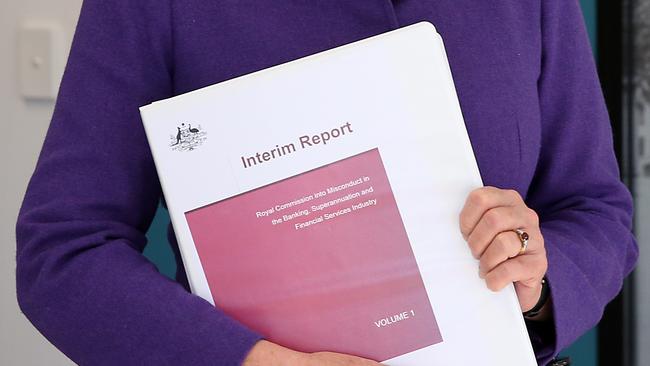
The banking royal commissioner Kenneth Hayne has said it was not just “greed” that drove the banking misconduct but a soft-touch treatment by financial regulators that allowed the banks to believe they could decide when and how laws would be obeyed.
In the royal commission’s interim report released today (full report here and executive summary embedded below), Mr Hayne begged the questions “why” and “what now” after completing the first six months of his investigation into the financial services sector.
“Why did it happen? What can be done to avoid it happening again? These are now the key questions,” Mr Hayne said, introducing the 1000-page report.
The commissioner said that while “too often, the answer seems to be greed” and “the pursuit of short term profit at the expense of basic standards of honesty”, there was a need to probe why particular events came about.
Keep up with evolving highlights from the report via our live blog
“When misconduct was revealed, it either went unpunished or the consequences did not meet the seriousness of what had been done,” he said, singling out the Australian Securities & Investments Commission for failing to take the banks to court regularly, and in the case of the Australian Prudential Regulation Authority, at all.
Rather than overarching proposals, the royal commission’s interim report doesn’t include specific recommendations or specific referrals. But Mr Hayne has begged the question as to whether the law should be simplified to reflect the ideas that are already enshrined in law.
These included the “basic standards” of fairness and honesty, obeying the law, not misleading or deceiving, acting fairly, providing services that are fit for purpose, delivering services with reasonable care and skill, and, when acting for another, acting in the best interests of that other.
“The basic ideas are very simple. Should the law be simplified to reflect those ideas better,” Mr Hayne said.
Treasurer flags new laws or a toughening existing laws
Treasurer Josh Frydenberg said the interim report is a “frank and scathing assessment of the culture, conduct and compliance of our financial system”.
“Australians expect and deserve better,” he said.
“Significantly, the Commissioner observed infringement notices imposed penalties that were immaterial to the large banks,” Mr Frydenberg said.
“In his words, “Too often, entities have been treated in ways that would allow them to think that they, not ASIC, not the parliament, not the courts, will decide when and how the law will be obeyed or the consequence of the breach remedied,” he said.
“This is clearly unacceptable and cannot continue,” he said.
The Royal Commission’s interim report, released today, is a frank & scathing assessment of the culture, conduct & compliance in the financial sector. pic.twitter.com/8IehO5FICm
— Josh Frydenberg (@JoshFrydenberg) September 28, 2018
“The question that needs to be asked is how did this culture of greed and selling as the dominant focus, how was that allow to permeate the sector to produce adverse outcomes for consumers without being stamped out earlier and without the penalties that exist to be properly enforced,” he said.
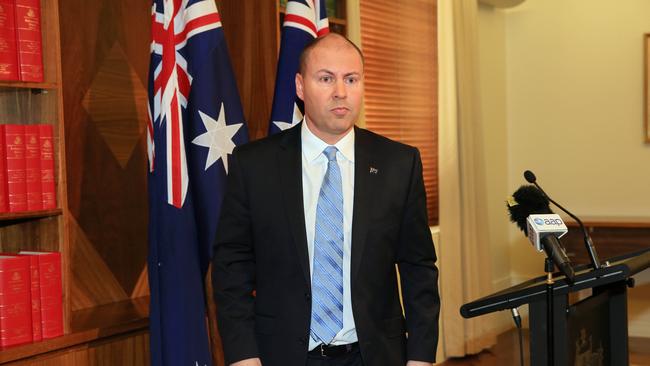
Josh Frydenberg also flagged new laws or a toughening existing laws to crack down on misconduct, noting the report “shines a very bright light on poor behaviour of our financial sector”.
The Treasurer said the corporate regulator would receive a “favourable hearing” from the Morrison government if it required more resources to enforce the law and crack down on a culture of greed.
“Banks and other financial institutions have put profits before people. Greed has been the motive, as short-term profits have been pursued at the expense of basic standards of honesty. Too often simply selling products and services have become the sole focus of attention,” Mr Frydenberg said.
“The Commissioner (Kenneth Hayne) makes a series of significant observations with respect to the effectiveness and the ability of regulators to detect, monitor and enforce compliance with the law. ASIC, the Commissioner points out, rarely went to court to seek public denunciation of and punishment for misconduct. Indeed, in his words, ‘little happened beyond an apology from the entity, drawn out remediation, and an infringement notice or an enforceable undertaking that acknowledged no more than ASIC had reasonable concerns about the entity’s conduct’.
Mr Frydenberg said the government would take the “necessary” action to restore the public’s trust in the financial system and reflected on Mr Hayne’s observation as to whether existing laws should be simplified, rather than adding extra layers of legal complexity.
“What is clear from this report is that too often the regulator would seek a negotiated outcome as opposed to taking the next step which would be to litigate and make these entities face court,” he said.
“It was a strategy that they had which saw the regulator working to closely with the sector that they were regulating.”
The Treasurer said he was not surprised by the findings in the three volumes of the interim report, given what evidence had been put forward at “gruelling” public hearings to date.
“The behaviour that we have seen to date has been unacceptable. Fees charged to dead people, fees for no service, 300,000 plus breaches for providing insurance advice that was unsolicited and against the rules. Many other examples of conduct which is unacceptable,” Mr Frydenberg said.
“But now that it has been revealed, now that we have the interim report and next year the final report, it is incumbent upon those in the financial services sector and those regulators who are charged with enforcing the law, lift their game because the public deserve it and the public expect it.”
Market reaction
Financial stocks have risen after the release, with all the major banks staging a turnaround. Commonwealth Bank (CBA) closed up 1.9 per cent from being up 0.76 per cent at 2pm (AEST). NAB (NAB) finished the session 1.76 per cent higher after being up only 0.22 per cent at 2pm, while Westpac (WBC) jumped 1.16 per cent after being down 0.74 per cent earlier and ANZ (ANZ) ended up 1.4 per cent gain from being down 0.11 per cent at 2pm. At the close, AMP shares were up 1.59 per cent compared to a 0.32 per cent gain at 2pm.
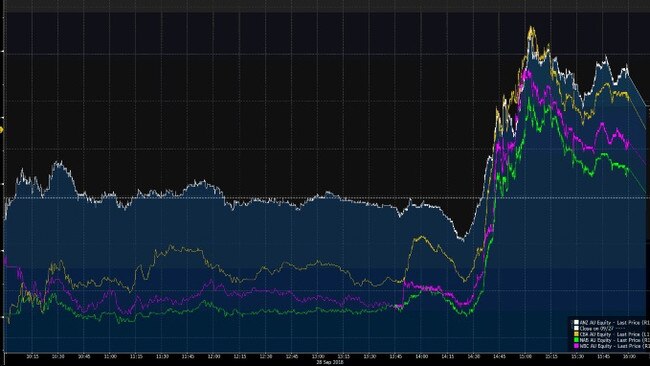
Big Four bank chiefs respond
ANZ boss Shayne Elliott said the release of the interim report was a “critical moment” for his industry and his bank to tackle the “urgent work required to fix the significant failures highlighted by the Commission”.
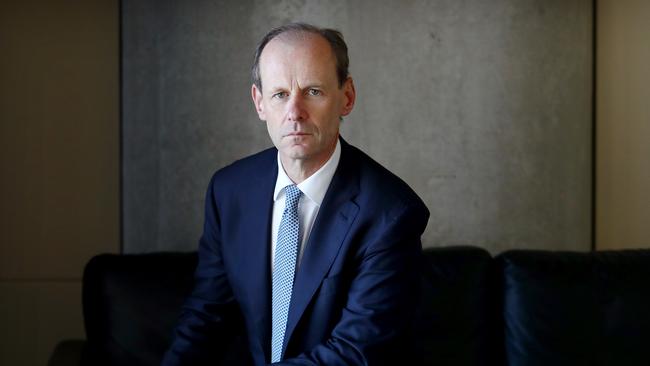
“While this work is well underway, there is more to do and today’s report clearly sets out the damage we can do when we fail our customers,” he said.
“We accept responsibility and we are determined to improve,” Mr Elliott said.
“ANZ is taking action to fast-track changes — leadership, strategic, systems, people and cultural. We will make the investments required to build a bank worthy of the trust and respect of our customers and the community.
“We will analyse the report in detail and respond directly to the Commissioner. We will also continue to engage constructively through the remainder of the process.”
NAB chief executive Andrew Thorburn said he would be digesting the royal commission interim report over the weekend after blitzing through the summary this afternoon.
“I would like to thank the Commissioner for his thoroughness and diligence,” Mr Thorburn said. “For us at NAB, where we have made mistakes or done the wrong thing, we will own them and fix them,” he said.
The man who was expected to take Mr Thorburn’s job at the end of his tenure, Andrew Hagger, is leaving the nation’s fourth largest lender after being accused of failing to be open and transparent with ASIC when he was dealing with the regulator over the bank’s fees for no service scandal.
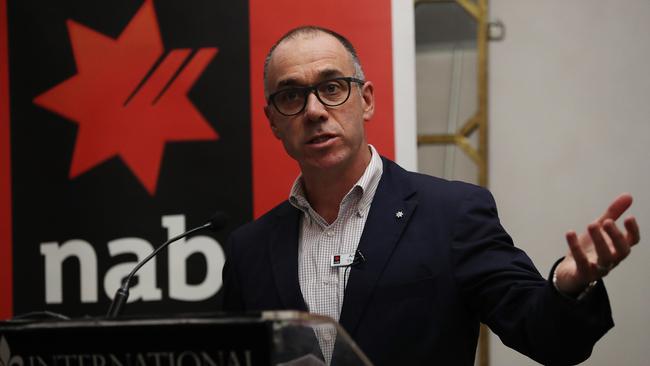
The royal commission heard NAB had withheld information from ASIC as to the size of its compensation bill for charging customers fees when they had received no service, which has blown out to almost $100 million
In a short statement after the release of the interim report, Mr Thorburn said Mr Thorburn said: “It is difficult to face the statement of ‘profits before people’, but this is exactly what we need to confront.” “Banking was built on putting people first and earning the trust of customers. We must return to these principles once again, rather than continuing to be short term managers,” he said.
Commonwealth Bank chief executive Matt Comyn said the royal commission was “rightly critical of our industry and our bank”.
“We have seen too many examples of unacceptable behaviour and unacceptable customer outcomes,” Mr Comyn said.
“The Commission has highlighted the need for significant changes, particularly to systems, processes and culture. I am committed to making sure that we learn from the failures detailed in this report to fix what went wrong and put things right for our customers,” he said.
Mr Comyn, who came to the top job earlier this year after former boss Ian Narev was forced to bring forward his resignation following a series of high-profile scandals, said CBA was already making a number of changes to its business and “will make more to meet the community’s expectations and earn trust”.
The publicity of CBA’s failings, such as its financial planning scandal, its mishandling of life insurance customers and its more than 50,000 breaches of anti-money laundering legislation contributed significantly to the momentum for a royal commission.
“The vast majority of our people do the right thing by their customers every day,” Mr Comyn said. “They have also been let down,” he said.
Westpac also issued a short media release noting the publication of the report.
“This report marks a significant step in the Royal Commission process. We’re reviewing it carefully and are focused on learning from the mistakes of the past and preventing them from happening again,” Westpac CEO Brian Hartzer said in the statement.
“The royal commission has identified many examples of misconduct across the industry. I apologise to any customers who have been impacted by mistakes that we have made.
“While we’ve introduced a number of reforms, including to our remuneration structures, our approaches to dealing with customer issues and removing grandfathered commissions attributable to BT products, we know we still have more work to do.”
Opposition reacts
Attempting to get on the front foot, acting Labor leader Tanya Plibersek announced a future Shorten government would set up a “financial services royal commission implementation taskforce” to “reform the culture of profit over people” in the sector.
The taskforce would be located within Treasury, Ms Plibersek said, and work closely with the Attorney-General’s department to implement the recommendations of the final banking royal commission report.
“The taskforce, of course, will work closely with victims and their advocates in recognition that the lived experience of the systemic misconduct in the banking sector should inform the response,” she said.
“Under a Shorten Labor government, Chris Bowen as treasurer will report to the parliament every six months on progress in implementation until the recommendations of the royal commission are fully implemented.”

Ms Plibersek said the Liberal Party had fought “tooth and nail” against the establishment of the royal commission for more than 600 days as she called for its extension so more victims from more places could be heard.
“Scott Morrison wanted to keep this shocking misconduct by the banks secret from the Australian public. This is the report that Scott Morrison never wanted. If it had been left up to Scott Morrison, banks would still be behaving this way,” she said.
“If it were up to him, the horrific stories would never have been told and the conduct would have continued. The Liberals have spent five years fighting for the top end of town. They delayed acting on the royal commission for 600 days. They voted against it 26 times. We know whose side they are really on.”
ASIC reacts
Australian Securities and Investments Commission chairman James Shipton said the interim report of the Hayne Royal Commission has made “serious and important” observations about the ASIC’s role as a regulator.
In a statement on the ASIC website the regulator said it would consider these observations and the broader findings of the inquiry and would respond by October 26.
“ASIC will continue to assist the Royal Commission and to work with the Government, the Parliament and other regulators to build a stronger legislative, enforcement and regulatory framework with tougher penalties.”
ASIC has provided much of the ammunition for the Royal Commission to air poor conduct by banks and financial services companies. But it was heavily criticised in the report and by the Treasurer Josh Frydenberg for not taking legal action to enforce the law and focusing instead on negotiated settlements.
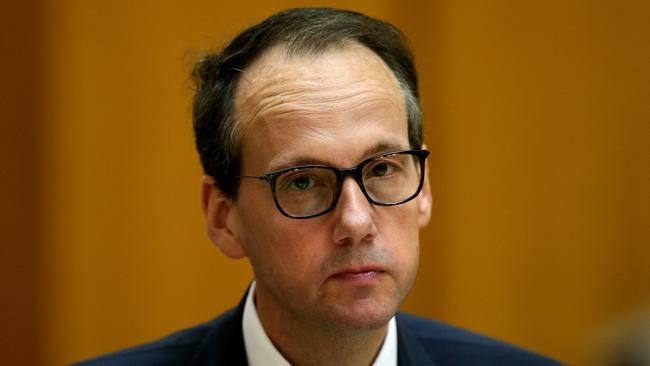
“When misconduct was revealed, it either went unpunished or the consequences did not meet the seriousness of what had been done,” Mr Hayne said.
“The conduct regulator, ASIC, rarely went to court to seek public denunciation of and punishment for misconduct. The prudential regulator, APRA, never went to court.
“Much more often than not, when misconduct was revealed, little happened beyond apology from the entity, a drawn out remediation program and protracted negotiation with ASIC of a media release, an infringement notice, or an enforceable undertaking that acknowledged no more than that ASIC had reasonable ‘concerns’ about the entity’s conduct.
“Infringement notices imposed penalties that were immaterial for the large banks. Enforceable undertakings might require a ‘community benefit payment’, but the amount was far less than the penalty that ASIC could properly have asked a court to impose.
APRA refuses to respond
The Australian Prudential Regulation Authority is refusing to comment on the release of the royal commission interim report, preferring to wait to make a formal submission to the inquiry.
“We will make a submission in response to the interim report by the due date by 26th of October,” an APRA spokeswoman said.
APRA was castigated by Commissioner Kenneth Hayne for failing to ever take court action against one its regulated companies.
Industry association and union reactions
Australian Banking Association chief executive Anna Bligh says the local banks now faced a ‘day of shame’ after the Royal Commission’s interim report found the sector was besieged by greed and profit taking.
Ms Bligh said the each of the Australian banks would ‘pay back every penny’ owed to customers who had been found to have been ripped off.
She said the industry realised that changes to their culture and organisational management would need to occur to meet the community’s expectations.
“All of these failures are totally unacceptable and too many customers have been hurt and it has to stop,” Ms Bligh said.
“Today is a day of shame for Australian banks …. having lost the trust of the Australian people we must do whatever it takes to earn that trust back.
“Banks accept full responsibility for their failures and right now people are working day and night to make things right for their customers and move from a selling culture to a service cultures. There is work to be done in every bank.”
Ms Bligh rejected criticism that the ABA’s initial campaigning against the Royal Commission’s establishment could make it less willing to adapt to regulatory and policy change in the future.
“There is nothing in this report for banks to feel proud of. Banks understand many things were revealed in the royal commission because of the powers it has that they (banks) didn’t expect,” she said.
“Australian banks have a big challenge ahead of them. Their job now is to find the problems and fix them and learn the lesson and repay every penny.”
Ms Bligh said the banks, and the ABA, would highlight whether proposed changes could lead to increased costs to consumers.
“As banks go through this report and consider it in every detail, we will be looking at it through the eyes of the customers,” she said.
“We will be highlighting to the commission, where necessary, if any of the proposals could have an unintended consequences for the lending systems or customers. But I think its too early to make any assumptions on that.”
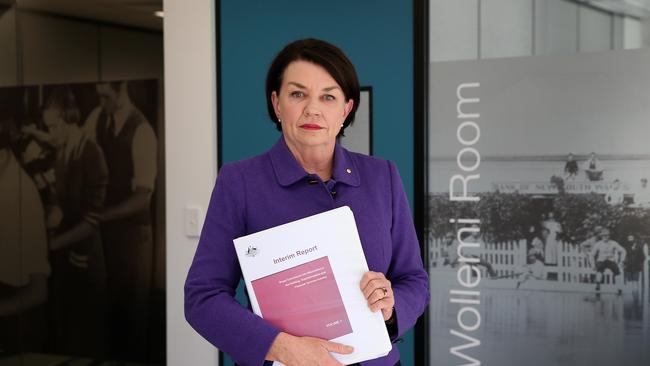
The Financial Services Council, which represents the for-profit superannuation, wealth management and life insurance sectors, said the royal commission showed the culture of the financial services industry must be urgently transformed to ensure organisations put the best interests of consumers at the heart of what they do.
FSC chief executive Sally Loane said the conduct of financial services providers over many years has been unacceptable.
The FSC had been one of the fiercest opponents of the Future of Financial Advice reforms ushered in under Labor.
“For consumers, interacting with banking and financial services is not voluntary,” Ms Loane said. “In a compulsory system everyone has a right to be treated with fairness, honesty and utmost professionalism. The industry takes responsibility for the culture that led to some deplorable outcomes for many consumers and a transformation is long overdue.”
The FSC said it backed Treasurer Josh Frydenberg’s comments that consumers must be put “first, second and third.”
The FSC also said it supported policy debate over “whether our complex regulatory framework could be simplified” and whether the existing rules and regulations must be better implemented and enforced.
“I thank Commissioner Hayne for a robust and thorough report which deserves time to be properly considered and absorbed,” Ms. Loane said.
The Finance Sector Union of Australia says the commission report has revealed some “appalling” stories of corporate greed and a “disturbing lack of compassion for customers”.
“We agree wholeheartedly with Treasurer Josh Frydenberg that the culture, conduct and compliance of many of our financial institutions falls well below community expectations and standards,” said FSU national secretary Julia Angrisano.
“We know how that greed was allowed to spiral out of control. It was because of conflicted remuneration, a sales culture that put profits before people and senior bankers and executives of financial corporations who were content to ride the gravy train of multimillion-dollar salaries and bonuses,” she said.
“Executives were driven by enormous salaries if they delivered short term profits. They did this by exploiting customers and bank staff.
“Bank workers who did their jobs diligently serving their customers were under extraordinary pressure to sell, sell, sell. Those who didn’t meet sales targets were driven out of the industry, or worse, lost their health and on occasion their lives.”
The FSU says once the final report is released, the government must make major changes, and ensure banks comply with them.
The Australian Institute of Company Directors says the interim Hayne report raises important questions about governance, regulation and enforcement which go to the failings in the sector.
“It is clear that some conduct fell well short of the expectations of stakeholders and the community, and that governance and risk-management frameworks of these financial institutions did not prevent or remedy wrong-doing,” said AICD chief Angus Armour.
“Furthermore, the administration and enforcement of existing laws has been called into question.”
He said the AICD will make a submission before the final report and believes the inquiry’s work “presents an important opportunity to improve the governance and practices of this vital sector”.




To join the conversation, please log in. Don't have an account? Register
Join the conversation, you are commenting as Logout